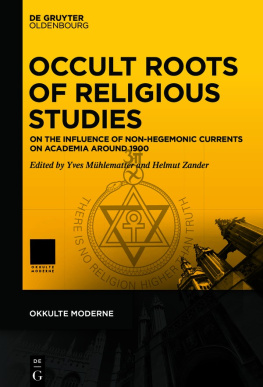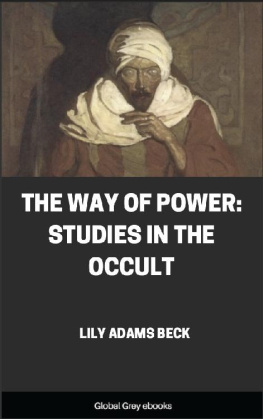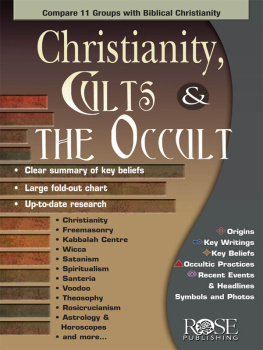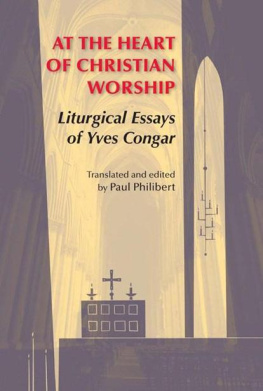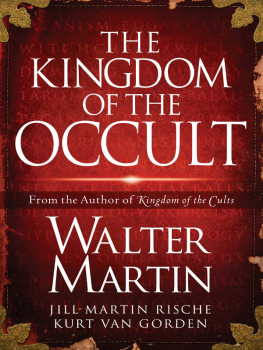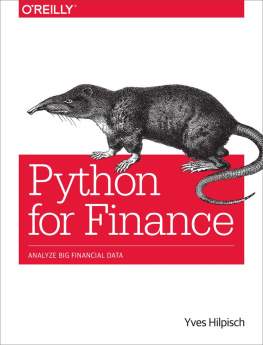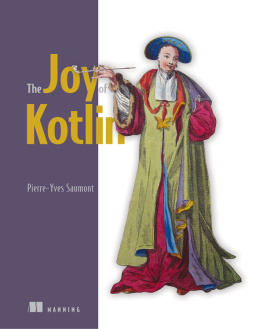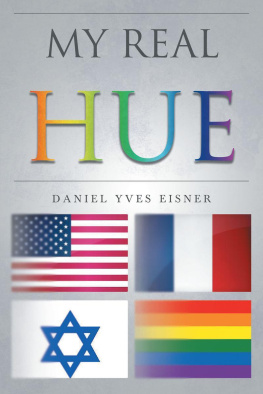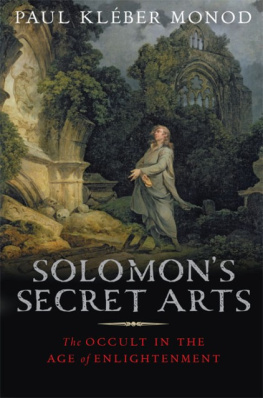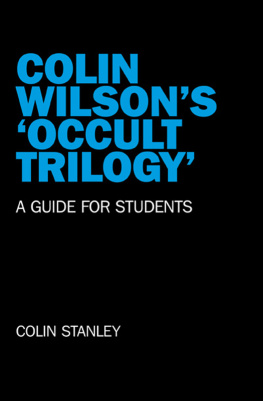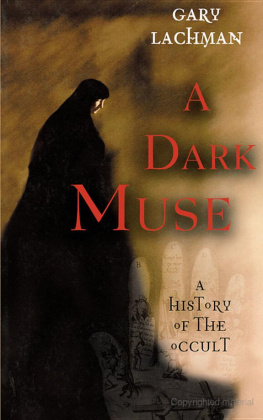Yves Mühlematter - Occult Roots of Religious Studies
Here you can read online Yves Mühlematter - Occult Roots of Religious Studies full text of the book (entire story) in english for free. Download pdf and epub, get meaning, cover and reviews about this ebook. year: 2021, publisher: De Gruyter, genre: Religion. Description of the work, (preface) as well as reviews are available. Best literature library LitArk.com created for fans of good reading and offers a wide selection of genres:
Romance novel
Science fiction
Adventure
Detective
Science
History
Home and family
Prose
Art
Politics
Computer
Non-fiction
Religion
Business
Children
Humor
Choose a favorite category and find really read worthwhile books. Enjoy immersion in the world of imagination, feel the emotions of the characters or learn something new for yourself, make an fascinating discovery.
- Book:Occult Roots of Religious Studies
- Author:
- Publisher:De Gruyter
- Genre:
- Year:2021
- Rating:3 / 5
- Favourites:Add to favourites
- Your mark:
- 60
- 1
- 2
- 3
- 4
- 5
Occult Roots of Religious Studies: summary, description and annotation
We offer to read an annotation, description, summary or preface (depends on what the author of the book "Occult Roots of Religious Studies" wrote himself). If you haven't found the necessary information about the book — write in the comments, we will try to find it.
Occult Roots of Religious Studies — read online for free the complete book (whole text) full work
Below is the text of the book, divided by pages. System saving the place of the last page read, allows you to conveniently read the book "Occult Roots of Religious Studies" online for free, without having to search again every time where you left off. Put a bookmark, and you can go to the page where you finished reading at any time.
Font size:
Interval:
Bookmark:

This work is licensed under the Creative Commons Attribution-NonCommercial-NoDerivatives 4.0 International License.
- Yves Mhlematter, Helmut Zander The Occult Roots of Religious Studies: An Introduction
- Occultism and Religious Studies
- University History
- Biographies
- Goals and Contributions
- Acknowledgment
- Helmut Zander What Is Esotericism? Does It Exist? How Can It Be Understood?
- The Religionist Problem of Esotericism
- Merits and Limits of the Scholarly Debates
- Global Esotericism
- Proposal: An Open Concept of Esotericism
- Marco Frenschkowski The Science of Religion, Folklore Studies, and the Occult Field in Great Britain (18701914): Some Observations on Competition and Cain-Abel Conflicts
- The Emergence of a New Science of Religion in Great Britain: Introductory Remarks
- The Science of Religion and Its Hidden Dialogue with Occultism
- Basic Agendas I: The Unity of Religions, Past and Future
- Basic Agendas II: The Concept of Comparison in Comparative Religion
- The Science of Religion in a Social World of Competing Learned Societies
- A Well-known Example of a Cain-Abel Conflict: Theosophical Society vs. S.P.R.
- Madame Blavatsky and Max Mller: What the Competition Means
- Conclusion
- Daniel Cyranka Magnetism, Spiritualism, and the Academy: The Case of Nees von Esenbeck, President of the Academy of the Natural Sciences Leopoldina (18181858)
- Nees, Science, Revolution, and Spiritualism: Preliminary Remarks
- Nees Interest in Magnetism and Vitalism and His Early Academic Career
- Nees Later Interest in Spiritualism
- On the Positioning of Spiritualism in Nees Biography
- Religionswissenschaft, Science, and Spirit-Seeing
- Nees Scientific Religion
- Science, Truth, and the Field of Religionswissenschaft
- Boaz Huss Academic Study of Kabbalah and Occultist Kabbalah
- Introduction
- The Academic Study of Kabbalah and Occult Kabbalah
- Gershom Scholems Rejection of Occultist Kabbalah
- Adolphe Franck
- Moses Gaster
- Joshua Abelson
- Ernst Mller
- Gershom Scholem Revisited
- Theosophy and Mysticism
- To Conclude
- Julian Strube Tantra as Experimental Science in the Works of John Woodroffe
- Introduction
- The Exchange between Bengali Intellectuals and Theosophists
- The Indian Occultism of Barad Knta Majumdr
- Woodroffe/Avalon and Western Esotericism
- The Orthodoxy of ivacandra Vidyrava
- Tantra as Experimental Science
- Tantra as Esoteric Tradition
- Tantra and the Comparative Study of Religions
- Jens Schlieter A Common Core of Theosophy in Celtic Myth, Yoga, and Tibetan Buddhism: Walter Y. Evans-Wentz and the Comparative Study of Religion
- Introduction
- Evans-Wentzs Life-Long Occupation: Theosophy, Animism, and Re-birth
- Evans-Wentz Tibetan Tetralogy
- Evans-Wentz Contribution to the Comparative Study of Religion
- Lo Bernard Paul Masson-Oursel (18821956): Inside and Outside the Academy
- Introduction
- The Plan of a Lifetime: La philosophie compare
- Masson-Oursel off the Beaten Academic Track: His Interest in Esoteric Matters
- His Relationship with Ren Gunon
- His Influence in the Spread of Neo-Hinduism
- His Acquaintance with the Ramakrishna Order
- The Collection Spiritualits Vivantes
- Neo-Hinduism from the Theosophical Society to the Academy
- Common Features in the Field of Discourses on India
- Further Issues
- Sabine Bhme The Ancient Processional Street of Babylon at the Pergamonmuseum Berlin: Walter Andraes Reconstruction and Its Anthroposophical Background
- Introduction
- Walter Andrae (18751956): Excavator, Architect, Curator
- The Riddle of Andraes Exhibition Concept
- From Das Gotteshaus und die Urform des Bauens im Alten Orient via Die Ionische Sule: Bauform oder Symbol to Alte Feststraen im Nahen Osten: Andraes Core Publications during the 1930s and Early 1940s and Their Anthroposophical Context
- The Inherent Context of the Processional Street and the Ishtar Gate Hall Ensemble of Babylon: An Example for Andraes Museal Concept
- The Sphinxes and the Throne Room Faade as Clue to the Cultic Meaning of the Processional Street and the Ishtar Gate Ensemble
- The Cultic Function of the Trilogy or the Gem of Babylon (Das Kleinod von Babylon) in the Museum of Ancient Near East According to Walter Andrae
- Abbreviations
- Publications
- Archives
- Short Biographies
- Ayni, Mehmet Ali (18681945)
- Dilek Sarmis
- Beckh, Hermann (18751937)
- Helmut Zander
- Coomaraswamy, Ananda Kentish (18771947)
- Mark Sedgwick
- Ehrenfels, Baron Omar (Umar) Rolf von (19011980)
- Reinhard Schulze
- Faivre, Antoine (*1934)
- Helmut Zander
- Johnston, Charles (18671931)
- Yves Mhlematter
- Kamensky, Anna (18671952) (Anna Alexeyevna Kamenskaya)
- Florence Pasche Guignard
- Mead, George Robert Stow (18631933)
- Helmut Zander
- Mautis, Georges (18901970)
- Lo Bernard
- Rousselle, Erwin (18901949)
- Karl Baier
- Schrader, Friedrich Otto (18761961)
- Judith Bodendrfer
- Seidenstcker, Karl Bernhard (18761936)
- Yves Mhlematter
- Suzuki, Daisetsu Teitar (18701966)
- Hans Martin Krmer
- van Manen, Mari Albert Johan (18771943)
- Karnina Kollmar-Paulenz
- Ayni, Mehmet Ali (18681945)
- Contributors
- Index
Font size:
Interval:
Bookmark:
Similar books «Occult Roots of Religious Studies»
Look at similar books to Occult Roots of Religious Studies. We have selected literature similar in name and meaning in the hope of providing readers with more options to find new, interesting, not yet read works.
Discussion, reviews of the book Occult Roots of Religious Studies and just readers' own opinions. Leave your comments, write what you think about the work, its meaning or the main characters. Specify what exactly you liked and what you didn't like, and why you think so.

